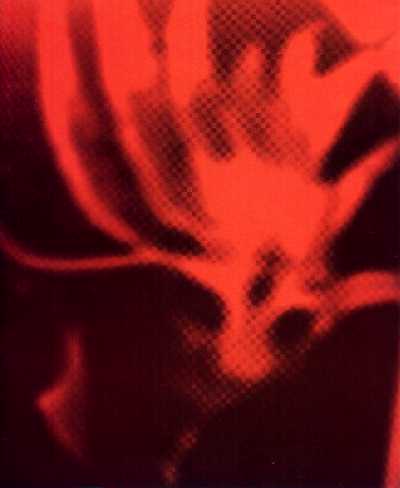
Plasm over ocean
The Dashuki Music Theatre performs Plasm over ocean a chamber opera in three scenes music by Dennis Báthory-Kitsz text by David Gunn

Plasm over ocean
The Dashuki Music Theatre
performs
Plasm over ocean
a chamber opera in three scenes
music by Dennis Báthory-Kitsz
text by David Gunn
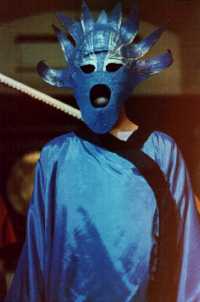 Costumes and masks: Janet Passow Gillock after designs by the composer
Costumes and masks: Janet Passow Gillock after designs by the composer
The Characters
Augmax / Shirley Strock Albright Dimmax / Linda Kay Retromax / David Gunn Max II / Janet Passow Gillock Maximus / Dennis Báthory-Kitsz Instrumental chorus: Francis Riesz Claire Manfredonia
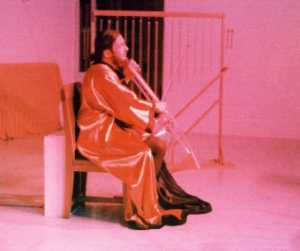 Directed by the composer
Directed by the composer
origamic pentagrams bathe me in my delirium shall I run the risk of waking up deceased? I, Maximus, philosopher and prophetic phre- netic of energumen, await execution swiftly colluded by my own clergymen's machination. mourn not my lot which the morning elicits; I shall suffer less than they, unless their accusations be truly false. am I then pure? darkness at once suffocates and nourishes me my brain tangrams with topologically enigma- tic flourishes and cheats me of tranquillity long ago a mantra shelved my thoughts and my thoughts atrophied; now I retain only veiled reminders of hylozoist platitudes and wizard words. I, Maximus, permutated creature of an inverted conundrum, need no execution to die convoluted interstices make gleamy caricature variables of death with taxes, their cosmetic affirmations of faith so naively presupposed. asleep my mind awash in light I fend them off sweet nothings galore assail my thoughts like the pallid drone of redundant cotton verse. a queer pile of corn and ducks vanishes nearby. would that such sophism might touch the dawn. I, Maximus, muted or permuted anagram of truth through hemlock, attend to Esperantus, until a tabloid replica of a post-mortem interrogation intrudes and sends other musings higgledy-pig- gledy. has the brain concocted cerebral heresy or am I fated to croon Happy Trails yet again. dream dances are routed by a sudden dawn as my thought-words mutate into logarithmic spirals.
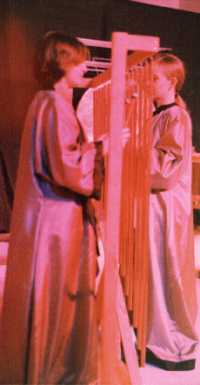 Max, philosopher and prophet phrenetic, awaits
execution colluded swiftly, for mourning not are
mornings, if only less he shall suffer.
Max, philosopher and prophet phrenetic, awaits
execution colluded swiftly, for mourning not are
mornings, if only less he shall suffer.
Suffer shall he less, only if mornings are not mourning, for swiftly colluded execution awaits phrenetic prophet and philosopher Max.
Execution... Death... Darkness at once suffocates and nourishes tangrams of brain, his topologically enigmatic flourishes, tranquillity, his shelved and atrophied thoughts; retains he reminders: veiled hylozoist platitudes, wizardry of words -- permutated and inverted creature, this Max!
Max (this creature inverted and permutated) words of wizardry, platitudes hylozoist, veiled reminders he retains: thoughts atrophied and shelved. His tranquillity flourishes enigmatic topologically -- his brain of tangrams nourishes and suffocates once at darkness! death! execution!
Had born-eroded light (no man is sent) seen I, Max? Enemy -- mere helixes atoning -- is won never. Even I flown am. As a whore we live no less, even if on fire. Reviled enemy, confined I am drawn. I revel! ...confined exotox elan! If not, I await on final exotox Eden! If no clever inward maiden, if no cymene deliverer, if no fine vessel (on evil ewer), oh was a man-wolf I never, even now? Sign I not as exile. Here my men examine estness in a month gilded or enrob'd (ah!).
Again Happy Trails crooning my fates, brain-concocted cerebral heresy. Esperantus, to attend hemlock through truth of anagram is permuted -- or muted.
Muted or permuted is anagram of truth through hemlock. Attend to Esperantus, heresy. Cerebral concocted brain fates my crooning Happy Trails again.
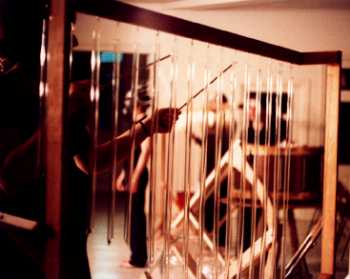 Convoluted interstices make variables of death
taxes, affirmatives in faith cosmetic -- my mind
asleep, awash... Sweet nothing verse of cotton
redundant. The corn and ducks vanish!
Convoluted interstices make variables of death
taxes, affirmatives in faith cosmetic -- my mind
asleep, awash... Sweet nothing verse of cotton
redundant. The corn and ducks vanish!
Execution... Death... Darkness at once suffocates and nourishes tangrams of brain. His topologically enigmatic flourishes! Tranquillity! His shelved and atrophied thoughts -- retains he reminders... veiled hylozoist platitudes, wizardry of words. Permutated and inverted creature, this Max!
Vanish ducks and corn! The redundant cotton of verse... Nothing sweet awash, asleep mind. My cosmetic faith in affirmatives taxes death. (Of variables, make interstices convoluted).
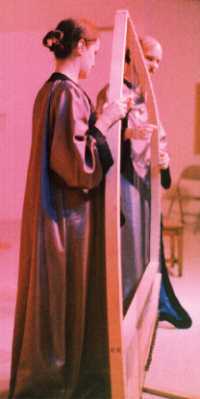 whether to admit to corporality or asylum,
whether to admit to corporality or asylum,
I, Maximus,
should no longer presume
upon my carefully squandered hypocrisy.
provocations of years past
become mere syllables now,
diffracting into grotesque asymmetry
the great impassionate dialectics of my fantasies:
a true mathematical puzzle
without logic.
ah, but transition approaches with inexorable sweetness:
an ocean of crystalline abstractions
washes over my delirium
and I am gently seized
by a tantalizingly slow reflux of pacific ambiguity.
no silence,
no rest, no will,
transmundane wail...
in words hallowed peace,
no world, mind alone,
silence
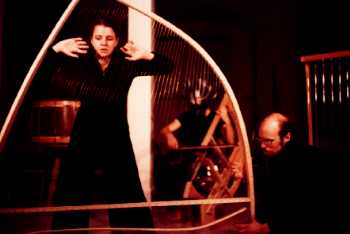 I exist in a sort of corpulent void,
I exist in a sort of corpulent void,
while contemplative ripples
of past poiitics
surge by unnoticed.
somewhere between the ether and nether
I grope for my rare destination,
a lethargic tract of abandoned vertigo.
I, Maximus,
my head enveloped in sand and clouds,
may yet conjure platonic colors
or mystic immolations
from my throne and altar.
ah, but the bewitching sweetness of permutation beckons:
and the origamic pentagram tangrams with
the plasm.
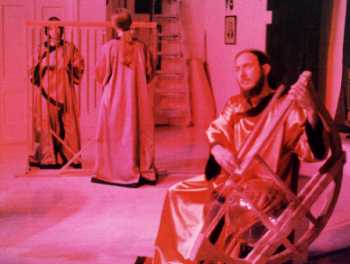
this Maximus,
this unhallowed interpolator
of our carnal mantra,
accepts only his own illusive phantasmagory
of contemplating truth through hemlock.
his plasm over ocean
yields
talismanically sweet delusions
of earthly cabala,
tangramming
the ether and nether
with cryptic flourishes
of cerebrally topologic anagrams.
diffuse the plasm!
sunder the origamic pentagram!
abandon this philosophic and phrenetic abstraction
to Esperantus!
condemn his permutation to Vertigo:
his mantra
shall I
tangram
with his deleria!
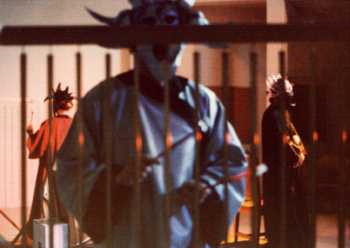 It ceases.
It ceases.
Mi estas unu kun Esperantus!
The mantra, that gentle annihilator
of thought-words, finally ceases!
SCENE THREE
Ha! My brain, for so long the pawn, for so long the gloomy detritus of your plasmic damnation, may once again attend to my all-consuming idolatry! Ha! Begone, aberrational abstractions, cerebral anagrams! I, Maximus, am one with Esperantus! Welcome, preconsciousness, which for so long slept fitfully in emaciated asphyxia! O plasm, diaphanous complexus of both sage and fool, of quietus and quietude, where now are your qualmy delusions? Do you dare to raze my consciousness before the permutation of my dementia into deleria is complete? Mi estas unu kun Esperantus! I, Maximus, topologic madman or sacrificial demigod, await only the tangramming of the origamic pentagram with the plasm!
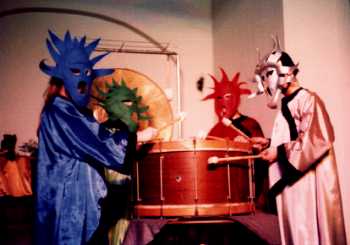
Esperantus... my brain... ceases! Ahh, my mind is tangramming with... my mind is tangramming with... The ocean! No! Darkness, death, give me life! Ha! Esperantus, O verbose spirit guide, why won't you speak to me? Ahh, I see you, too, are confused. Well, pay it no heed... I'll have my clergy speak to you. Esperantus, do you dare doubt me? Can you even see me? Night, dawn, morning... where is there a difference? I can see myself... ahh, what is that which oozes so benignly from your face, Esperantus? O trembling spiritual... what? It seems that I shall have to take this up with my clergy, and they shall decide what to do with you. Your origam confuses me! Begone, dull Esperantus! Requiescat in grece! I, Maximus, am compelled to show you your weak plasm. Sadness, Esperantus? I can understand... mi estas unu kun Maximus! Mi plasm estas unu kun... my deleria! Ha! Relax, Esperantus, we've got all the time in the world...
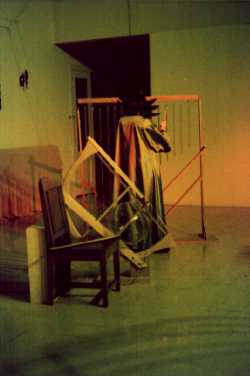
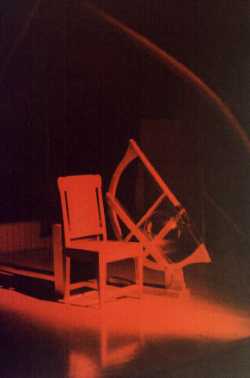 By his own account, Maximus is a philosopher and the
leader of a mystic religious sect. He used to be a profound
thinker until he focused on a mantra to such an extent that
his thoughts atrophied, leaving him with only scattered
memories and half-realizations. One of these is that he
is awaiting execution, having been betrayed and falsely
branded a heretic by the other clergymen in the sect.
If only he could focus his thoughts, surely he could
prove himself pure and forestall his fate.
By his own account, Maximus is a philosopher and the
leader of a mystic religious sect. He used to be a profound
thinker until he focused on a mantra to such an extent that
his thoughts atrophied, leaving him with only scattered
memories and half-realizations. One of these is that he
is awaiting execution, having been betrayed and falsely
branded a heretic by the other clergymen in the sect.
If only he could focus his thoughts, surely he could
prove himself pure and forestall his fate.But perhaps he is already dead -- or perhaps it is all a hallucination. Max is not sure.
Now he is conscious of the clergy condemning him, as the relentless drumbeat of the mantra pounds through his brain. His scattered thoughts beckon with seductive glimpses of an eternal fantasy, causing him to lose track of his predicament over and over again.
Then suddenly, his mantra ceases, much to Max's relief and surprise. He reasons that at last he has attained the same spiritual plateau as Esperantus, his mystical spirit guide, and thus has proved himself pure and vindicated himself in the eyes of his enemies. But triumph quickly turns to bewilderment, for Max seems to have left his physical body somewhere along the way.
Does this mean that he is physically dead? Or is this, too, a hallucination? Esperantus, the source of universal truth, appears to be as confused as Maximus.
But... is there really an Esperantus? Maximus is far from certain.
Notes by Linda Kay
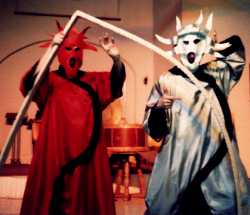 The characters in "Plasm" are all permutations of the central
personage, Maximus: Dimmax, the frenetic diminutive of Maximus;
Augmax, the languorous, highly melodic augmentations; Retromax,
the speaking inversion; and Max II, the alter ego and non-reversing
mirror.
The characters in "Plasm" are all permutations of the central
personage, Maximus: Dimmax, the frenetic diminutive of Maximus;
Augmax, the languorous, highly melodic augmentations; Retromax,
the speaking inversion; and Max II, the alter ego and non-reversing
mirror.
The first scene, a circularly cohesive collection of Maximus' thoughts, uses the device of the palindrome to emphasize its invertible qualities. Each of the permutations of Maximus has a part that can be spoken backward -- yet each one must remain locked into responding to Maximus' speeches.
The second and third scenes represent other departures -- they are reductions rather than developments of the thematic material. Unlike traditional practice, where musical ideas are presented first in their simplest forms, these fully developed materials are gradually reduced to primitive, elementary evocative musicality.
Finally, "Plasm over ocean" is one of those many contemporary compositions which are in many ways exclusive, not universal. Costumes, masks, choreography, text, music, instruments and lighting have all been developed for the work as a whole - not merely this performance. Melodic lines were constructed in consultation with the performers, and instruments and instrumental practice developed in line with the potential skills of each member. In other words, this composition must be re-written for each group of musicians that attempts its performance.
"His plasm over ocean yields talismanically sweet delusions of earhly cabala, tangramming the ether and nether with cryptic flourishes of cerebrally topologic anagrams."
The Brass Chimes follow in number and framing the original glass set. These are different from standard orchestral chimes not only in their tuning (sixteen equal pitches 1 1/4 steps apart), but also in the way their thick walls emphasize the strong color and harmonic content of the brass. They are mounted on the frame with metal hooks.
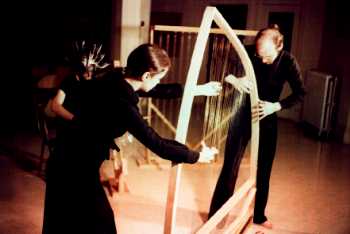 The Hharp is of particularly unusual design, hardly related at
all to the traditional instrument of the same name. Most unusual is the tone
quality itself. Strongly reminiscent of the koto, the Hharp spans
a wider range, comprised of sixty strings. These strings are tuned geometrically,
increasing in pitch distance as they move into the treble range. The frame is maple,
the pins are brass, and the sounding board is plexiglas. The strings are attached
to brass hitch pins and run over a maple bridge which is mounted, harpsichord-style,
to the sounding board.
The Hharp is of particularly unusual design, hardly related at
all to the traditional instrument of the same name. Most unusual is the tone
quality itself. Strongly reminiscent of the koto, the Hharp spans
a wider range, comprised of sixty strings. These strings are tuned geometrically,
increasing in pitch distance as they move into the treble range. The frame is maple,
the pins are brass, and the sounding board is plexiglas. The strings are attached
to brass hitch pins and run over a maple bridge which is mounted, harpsichord-style,
to the sounding board.
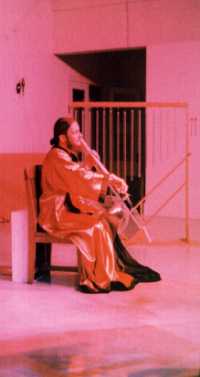 The Uncello is tuned in the traditional manner and played with a
standard bow, but beyond that, bears little relationship to the familiar orchestral
instrument. Large curves of maple and glass make up the frame and sounding surface
of the Uncello, both softening the sound of the strings and emphasizing
their harmonic content -- a goal, in fact, of all the instruments designed for this
composition. For this performance, the Uncello has been amplified
with a capacitive transducer, thus allowing accurate reproduction of the instrument's
sound.
The Uncello is tuned in the traditional manner and played with a
standard bow, but beyond that, bears little relationship to the familiar orchestral
instrument. Large curves of maple and glass make up the frame and sounding surface
of the Uncello, both softening the sound of the strings and emphasizing
their harmonic content -- a goal, in fact, of all the instruments designed for this
composition. For this performance, the Uncello has been amplified
with a capacitive transducer, thus allowing accurate reproduction of the instrument's
sound.
The Gong was the last of the instruments completed for this work. It is three feet across, and made from 1/16th-inch sheet brass. The material has been hammered and worked until the familiar "rushing" sound of the gong was achieved. The center design by artist Trevor Bryant was applied by silkscreen. Texturing of the gong surface was done by David Gunn and Richard Fredette.
List and descriptions of all the composer's instruments.
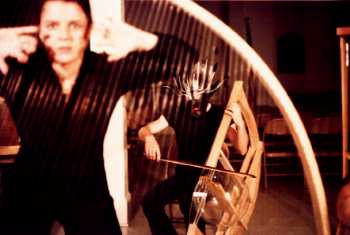
Pages produced by Malted/Media Productions